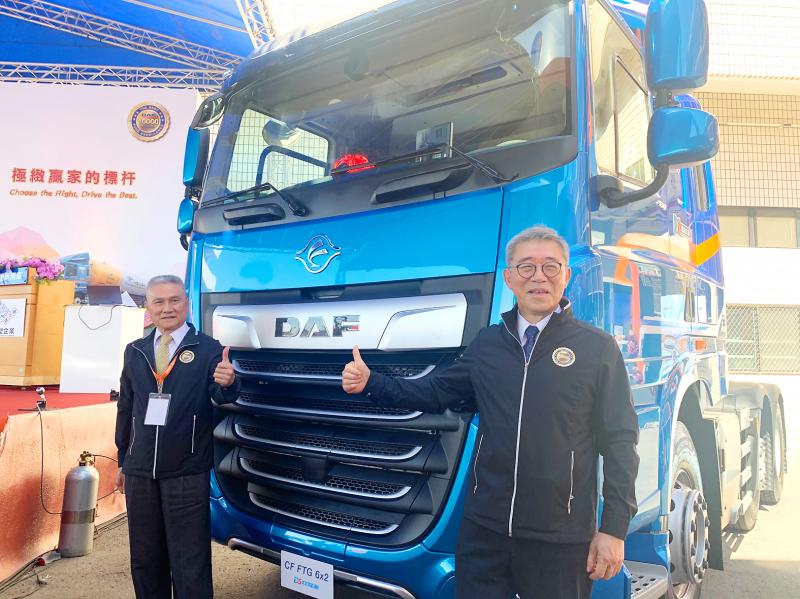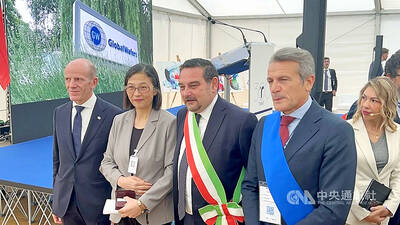Formosa Automobile Sales Corp (台塑汽車) is developing batteries in-house to prepare for production of its own electric trucks, which are expected to hit the market in 2022, company chairman Chen Sheng-kuang (陳勝光) said yesterday.
Speaking at an event to promoting the DAF CF Euro 6 trucks, Chen said that the company, a subsidiary of Formosa Plastics Group (FPG, 台塑集團), has been working on e-truck development for some time in anticipation of robust demand.
FPG founders Wang Yung-ching (王永慶) and Wang Yung-tsai (王永在), who died in 2008 and 2014 respectively, predicted that electric vehicles would become the dominant method of transportation, which is why Formosa Automobile has steadily invested in electric-vehicle batteries, Chen said.

Photo: Chang Hui-wen, Taipei Times
The company is planning to produce 6.5-tonne and 12-tonne e-trucks, and a 10-tonne e-bus, he said.
The heavier e-truck is being designed on an existing frame, with the addition of an electric motor, electronic control systems and batteries, he said.
Formosa Automobile would begin to assemble and test a prototype in June next year and it hopes the vehicle can hit the local market in 2022, Chen said.
The lighter e-truck and the e-bus are scheduled to enter the market from 2022 to 2025 respectively, he said.
The company has handled the marketing, sales and production of DAF trucks in Taiwan since 2005.
Chen said that the company reached a milestone this year when it sold its 10,000th DAF truck after 15 years in the local market.
The firm forecast that it would take another six years to sell another 10,000 DAF trucks locally.

RECYCLE: Taiwan would aid manufacturers in refining rare earths from discarded appliances, which would fit the nation’s circular economy goals, minister Kung said Taiwan would work with the US and Japan on a proposed cooperation initiative in response to Beijing’s newly announced rare earth export curbs, Minister of Economic Affairs Kung Ming-hsin (龔明鑫) said yesterday. China last week announced new restrictions requiring companies to obtain export licenses if their products contain more than 0.1 percent of Chinese-origin rare earths by value. US Secretary of the Treasury Scott Bessent on Wednesday responded by saying that Beijing was “unreliable” in its rare earths exports, adding that the US would “neither be commanded, nor controlled” by China, several media outlets reported. Japanese Minister of Finance Katsunobu Kato yesterday also

‘DRAMATIC AND POSITIVE’: AI growth would be better than it previously forecast and would stay robust even if the Chinese market became inaccessible for customers, it said Taiwan Semiconductor Manufacturing Co (TSMC, 台積電) yesterday raised its full-year revenue growth outlook after posting record profit for last quarter, despite growing market concern about an artificial intelligence (AI) bubble. The company said it expects revenue to expand about 35 percent year-on-year, driven mainly by faster-than-expected demand for leading-edge chips for AI applications. The world’s biggest contract chipmaker in July projected that revenue this year would expand about 30 percent in US dollar terms. The company also slightly hiked its capital expenditure for this year to US$40 billion to US$42 billion, compared with US$38 billion to US$42 billion it set previously. “AI demand actually

Jensen Huang (黃仁勳), founder and CEO of US-based artificial intelligence chip designer Nvidia Corp and Taiwan Semiconductor Manufacturing Co (TSMC, 台積電) on Friday celebrated the first Nvidia Blackwell wafer produced on US soil. Huang visited TSMC’s advanced wafer fab in the US state of Arizona and joined the Taiwanese chipmaker’s executives to witness the efforts to “build the infrastructure that powers the world’s AI factories, right here in America,” Nvidia said in a statement. At the event, Huang joined Y.L. Wang (王英郎), vice president of operations at TSMC, in signing their names on the Blackwell wafer to

Taiwan-based GlobalWafers Co., the world’s third largest silicon wafer supplier, on Wednesday opened a 12-inch silicon wafer plant in Novara, northern Italy - the country’s most advanced silicon wafer facility to date. The new plant, coded “Fab300,” was launched by GlobalWafers’ Italian subsidiary MEMC Electronics Materials S.p.A at a ceremony attended by Taiwan’s representative to Italy Vincent Tsai (蔡允中), MEMC President Marco Sciamanna and Novara Mayor Alessandro Canelli. GlobalWafers Chairwoman Doris Hsu (徐秀蘭) said the investment marked a milestone in the company’s expansion in Europe, adding that the Novara plant will be powered entirely by renewable energy - a reflection of its